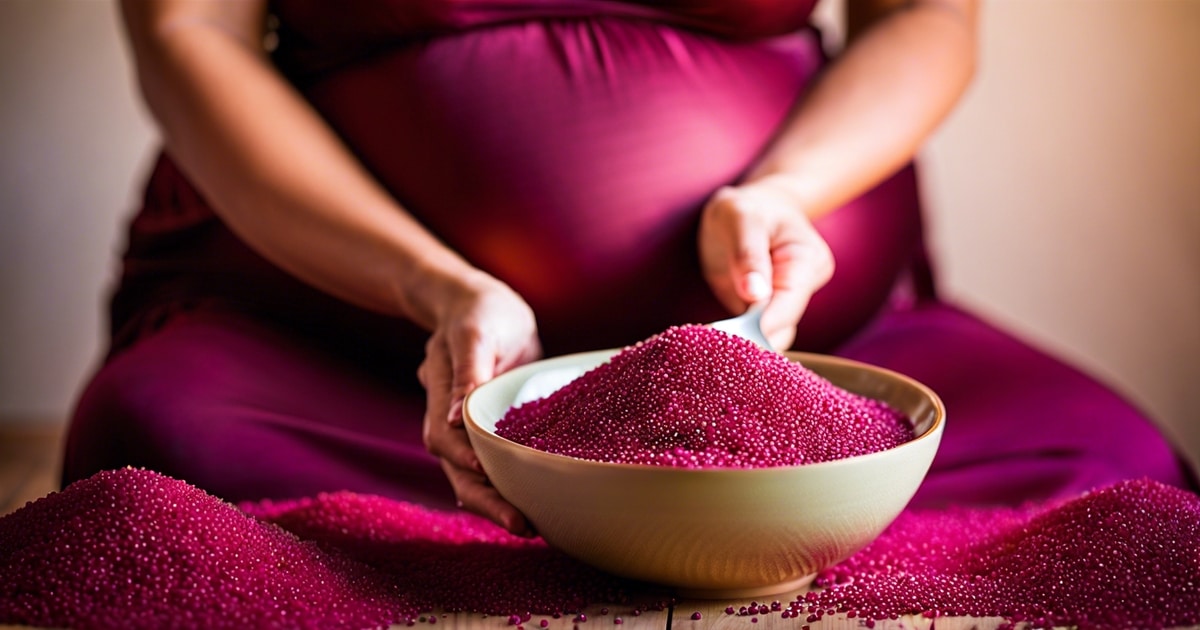Key Takeaways
-
Incorporate amaranth into your pregnancy diet: Amaranth is a nutritious grain rich in essential nutrients, such as folate and iron, that are beneficial for pregnant women.
-
Opt for safe food choices: To mitigate potential risks, ensure the amaranth you consume during pregnancy is properly cooked and sourced from reputable sources.
-
Consult with a nutrition expert: Seek guidance from a healthcare provider or nutritionist to create a well-rounded pregnancy diet plan that includes amaranth and other essential nutrients.
-
Consider supplements: While amaranth is a valuable addition to your diet, it’s essential to discuss the need for prenatal supplements with your healthcare provider to meet all nutritional requirements during pregnancy.
-
Be aware of potential risks: Understand the risks associated with consuming amaranth during pregnancy, such as allergies or contamination, and take necessary precautions.
-
Prioritize a balanced diet: Combine amaranth with other nutrient-dense foods to ensure you meet all your nutritional needs for a healthy pregnancy.
Ever wondered about the benefits of incorporating amaranth into your pregnancy diet? Curious about how this superfood can boost your health during this crucial time? Let’s dive into amaranth during pregnancy and uncover its nutritional advantages, potential concerns, and delicious ways to include it in your meals. Stay tuned for a comprehensive guide to help you make informed choices for a healthy and fulfilling pregnancy journey.
Nutritional Guidelines for Pregnant Women

Importance of Consuming Amaranth during Pregnancy
Amaranth is a nutritious grain that can benefit pregnant women due to its high content of essential nutrients like iron and folate. Iron helps prevent anemia, which is common in pregnancy, while folate aids in the baby’s neural tube development.
Consuming amaranth during pregnancy can also help regulate blood sugar levels due to its high fiber content. This can be particularly helpful for pregnant women at risk of gestational diabetes. The fiber in amaranth supports a healthy digestive system, reducing issues like constipation often experienced during pregnancy.
-
Rich in iron and folate
-
Regulates blood sugar levels
-
Supports digestive health
Ways to Incorporate Amaranth into a Pregnancy Diet
Adding amaranth to meals is simple; it can be cooked similarly to rice or quinoa. For breakfast, try a warm amaranth porridge topped with fruits or nuts. Alternatively, incorporate it into salads or soups for added daily nutrients.
Here are some easy ways to include amaranth:
-
Cooked as a side dish instead of rice
-
Added to homemade granola bars or energy bites
Understanding the Role of Amaranth in Pregnancy Nutrition

Essential Nutrients in Amaranth
Amaranth is a gluten-free whole grain packed with vital nutrients for pregnant women. It contains significant amounts of folate, iron, and calcium, all essential during pregnancy. Folate aids in preventing birth defects, while iron supports the increased blood volume needed during pregnancy.
Amaranth’s rich nutrient profile helps meet the heightened demands of pregnancy. For instance, calcium is vital in developing your baby’s bones and teeth. Meanwhile, iron is necessary to carry oxygen to your baby throughout pregnancy.
Digestive Health Benefits
The high fiber content found in amaranth can be particularly beneficial during pregnancy by supporting digestive health. Fiber helps prevent constipation, which is common among pregnant women due to hormonal changes affecting digestion. By incorporating amaranth into your diet, you can promote regular bowel movements and alleviate discomfort associated with constipation.
-
Folate: Prevents birth defects.
-
Iron: Supports increased blood volume.
-
Calcium: Crucial for bone development.
-
Fiber: Aids in preventing constipation.
Health Benefits of Amaranth for Pregnant Women
Folate Content
Amaranth seeds are a powerhouse of nutrients, especially folate. This essential nutrient plays a crucial role in the healthy development of the baby’s neural tube. By incorporating amaranth into their diet, pregnant women can ensure proper growth and development of the baby’s brain and spinal cord.
Amaranth is an excellent choice for expecting mothers as it helps prevent anemia during pregnancy. The iron content in amaranth is vital for blood production, reducing the risk of maternal anemia and ensuring both the mother and baby receive an adequate oxygen supply.
Calcium for Bone Health
The calcium content found in amaranth supports bone health, benefiting both the mother and baby. During pregnancy, calcium is essential for developing strong bones and teeth in the growing fetus. By consuming amaranth regularly, pregnant women can maintain bone density while supporting optimal skeletal development in their babies.
-
Pros:
-
Rich source of folate aiding neural tube development.
-
Helps prevent anemia due to high iron levels.
-
Supports bone health with essential calcium content.
Safe Food Choices During Pregnancy
Safe Food Choices
During pregnancy, it’s crucial to make safe food choices to ensure the well-being of both the mother and the baby. Opt for healthy options like pasteurized dairy products to reduce the risk of foodborne illnesses. Choose well-cooked eggs over raw or undercooked ones to minimize the chance of salmonella contamination.
Avoid unpasteurized cheeses and deli meats when planning your meals, as they can harbor harmful bacteria that may lead to infections during pregnancy. Prioritize good sources of nutrients such as leafy vegetables, milk products, sesame seeds, and sweet potatoes for a healthy pregnancy journey.
Nutrient-Rich Options
Incorporating nutrient-rich foods like amaranth into your diet during pregnancy can provide essential vitamins and minerals for fetal development. Consider adding amaranth to your meals as a food crop high in iron, calcium, and protein, which benefits both you and your baby’s health.
Remember that maintaining a balanced diet with fruits, vegetables, whole grains, lean proteins like meat or legumes is key during this period. You can support a healthy pregnancy by making informed food choices while enjoying flavorful and nutritious meals tailored to your needs.
Risks Associated with Consuming Amaranth During Pregnancy
Digestive Issues
Consuming amaranth during pregnancy in excess amounts can result in digestive problems such as bloating and gas. These issues may lead to discomfort and affect the overall well-being of pregnant individuals. To prevent these complications, practicing moderation when including amaranth in your diet is crucial.
Allergic Reactions
Some people may have allergies to amaranth, which could trigger adverse responses when consumed during pregnancy. Allergic reactions might vary from mild symptoms like itching or hives to severe conditions like anaphylaxis. Pregnant women need to be aware of any potential allergic reactions they may experience and consult a healthcare provider if needed.
To ensure a healthy pregnancy journey, moderation is key when incorporating amaranth into your diet. Being mindful of portion sizes and monitoring your body’s response can help mitigate any risks of consuming this nutritious grain-like seed.
Incorporating Amaranth into Pregnancy Diet Plans
Nutritious Alternative
Amaranth can be a great addition to your diet during pregnancy. Grain amaranth is a nutritious alternative to rice or quinoa, offering essential vitamins and minerals for your and your baby’s health.
Including cooked amaranth in meals like salads or soups can provide an extra nutritional boost. The versatility of this ancient grain allows it to blend seamlessly with various dishes, enhancing the overall nutrient content without compromising on taste.
Baking and Blending
Incorporating amaranth flour into smoothies or baked goods is another creative way to introduce this superfood into your pregnancy diet plan. By blending it with other ingredients, you can create nutrient-packed treats that cater to your cravings while ensuring you get the necessary nourishment.
When considering adding amaranth to your meals during pregnancy, consult your healthcare provider first to ensure it aligns with your dietary needs. Moderation is key when introducing new foods, including ancient grains like amaranth.
Expert Nutrition Tips for Expectant Mothers
Balanced Diet Recommendations
Consuming various nutrients during pregnancy is crucial for the health of both the mother and baby. A balanced diet comprising carbohydrates, proteins, fats, vitamins, and minerals is essential. Incorporating foods like amaranth can provide an array of these necessary nutrients.
Eating diverse foods ensures that pregnant moms receive all the vital nutrients required for a healthy pregnancy. For instance, including nuts in your diet can offer beneficial fats and proteins essential for fetal development. Incorporating iron-rich foods such as amaranth supports the body in producing more blood to meet the increased demands during pregnancy.
Listening to Your Body
Pregnant women should pay attention to their bodies’ hunger signals and eat when hungry while avoiding excessive calorie intake. Consuming nutrient-dense snacks like amaranth bars or incorporating amaranth into meals can help maintain energy levels throughout the day without consuming empty calories from processed snacks.
Importance of Supplements During Pregnancy
Essential Nutrients for Pregnancy
During pregnancy, supplements like prenatal vitamins are crucial to ensure the intake of key nutrients such as folic acid and iron. These supplements help support the healthy growth and development of the baby. For example, folic acid is vital in preventing birth defects related to the brain and spine.
It’s essential to discuss any supplement needs with your healthcare provider before starting them. Omega-3 supplements, known for supporting brain development, can be particularly important during pregnancy. These supplements contain docosahexaenoic acid (DHA), an omega-3 fatty acid that aids cognitive function.
Consulting Healthcare Providers
Before incorporating any new vitamins or amino acids, it’s crucial to consult with your doctor or midwife. They can provide personalized recommendations based on your specific needs and health conditions. Your healthcare provider will assess whether you require additional supplementation beyond a standard prenatal vitamin.
Remember that every pregnancy is unique, so what works for one person may not suit another. By discussing your supplement intake with a healthcare professional, you can ensure that you provide the best possible environment for yourself and your growing baby.
Final Remarks
You’ve now got the lowdown on how amaranth can be a game-changer during your pregnancy journey. Remember, balance is key! Don’t go overboard with it; moderation is your best bud. Remember those health benefits and risks we discussed, and always chat with your doctor before making big changes to your diet.
So, sprinkle some amazing magic into your meals, but always listen to what your body tells you. Your little one will thank you for nourishing yourself, right? Stay healthy, stay informed, and own this pregnancy journey like the superhero parent you are! Keep rocking that soon-to-be mom glow!
Frequently Asked Questions
Is amaranth a good source of nutrition during pregnancy?
Amaranth is an excellent source of essential nutrients like folate, iron, and calcium, which are crucial for pregnant women. Its high protein content aids fetal development and supports the mother’s health.
Can consuming amaranth help prevent birth defects?
Yes, amaranth is rich in folate, a B vitamin vital for preventing baby neural tube defects. Including amaranth in your pregnancy diet can contribute to overall maternal and fetal health.
Are there any risks associated with eating amaranth while pregnant?
While amaranth is generally safe to consume during pregnancy, some individuals may experience digestive issues due to its high fiber content. Introducing it gradually into your diet and monitoring how your body responds is advisable.
How can I incorporate amaranth into my pregnancy meal plan effectively?
You can enjoy amaranth by cooking it as porridge, adding it to soups or salads, or using it as a substitute for rice or quinoa. Experiment with different recipes to find delicious ways to include this nutritious grain.
Do I need supplements if I’m already consuming amaranth during pregnancy?
Although amaranth provides various essential nutrients, prenatal supplements are still recommended during pregnancy. Consult with your healthcare provider to ensure you meet all nutritional requirements for a healthy pregnancy journey.

